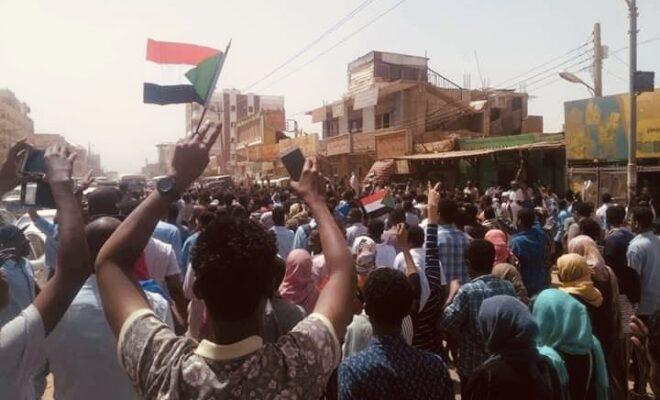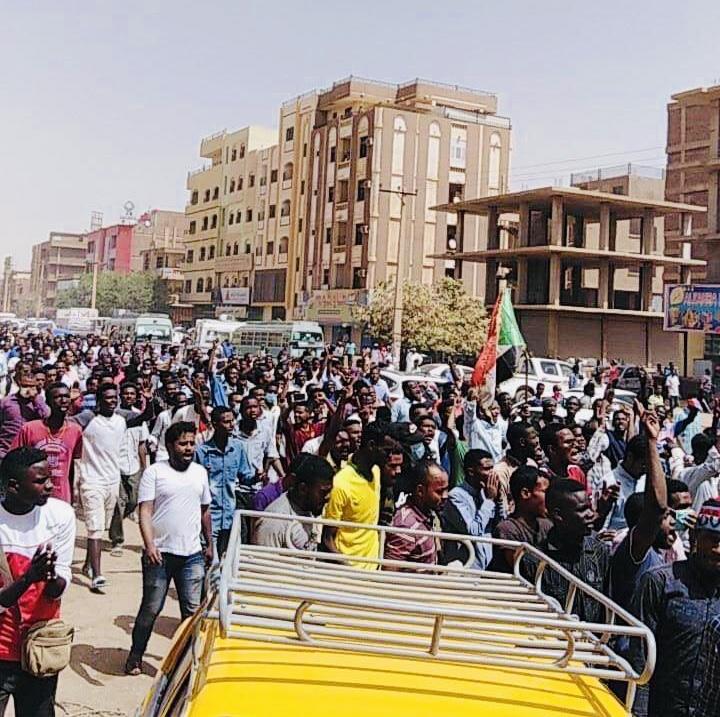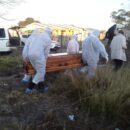
Debating Ideas is a new section that aims to reflect the values and editorial ethos of the African Arguments book series, publishing engaged, often radical, scholarship, original and activist writing from within the African continent and beyond. It will offer debates and engagements, contexts and controversies, and reviews and responses flowing from the African Arguments books.

2019 Protests in Khartoum, Sudan that removed Al Bashir’s Dictatorship
As the world rushes to contain the spread of the novel coronavirus disease (Covid-19), governments have turned to the most desperate mitigation strategies: closing borders. On January 31, the Trump administration announced that all visitors from China would be temporarily barred from entry to the US. In February and March, new restrictions were announced, barring US entry of foreign nationals from Iran, the European Union’s Schengen Area, which includes 26 European countries, as well as the United Kingdom and Ireland.
Though the efficacy of travel bans that target specific regions in controlling the spread of the coronavirus is questionable, national and international health organisations do agree that non-essential travel should be avoided in general, and particularly by those who are chronically sick or elderly, to limit individuals’ risk of acquiring the illness. Social distancing and self-isolation are the most effective strategies for combating a tremendous international public health threat like coronavirus. Thus, public health officials advocate for reduced movement of peoples at all levels – household, domestic, international – for the express purpose of ‘flattening the curve’, lowering the peak number of persons with the disease at one time and thereby reducing the strain on nations’ public health infrastructure. The Trump administration has used this argument to justify sweeping travel restrictions, stating that their intentions are for these restrictions to be temporary and their goal is to limit person-to-person transmission.
This is not the first time that Trump has instituted travel restrictions – but it is the first time the administration has applied travel restrictions with a clear goal in mind. On January 27, 2017, the Trump Administration announced Executive Order 13769 titled ‘Protecting the Nation from Foreign Terrorist Entry into the United States’ but what became more commonly known as the ‘Muslim ban’. This executive order sought to suspend the U.S. Refugee Admissions Program (USRAP) for 120 days as well as entry of nationals from Iran, Iraq, Libya, Somalia, Sudan, Syria, and Yemen.
Despite facing widespread condemnation and multiple legal challenges, on January 31, the Trump Administration expanded their restriction by adding six additional countries. Four of these countries – Sudan, Tanzania, Eritrea and Nigeria – are in Africa. All told, the restrictions place limits on potential immigration of more than a quarter of Africa’s 1.2 billion people. The US travel restrictions against Africans, which pre-date the Covid-19 pandemic, don’t have any tangible purpose or end point.
They also demonstrate that the US’s foreign policy approach is short-sighted. Many other nations are realising that the axes of geopolitical power in the upcoming decades will be determined by economic strength rather than military strength, and so they have searched for promising opportunities for economic investment. Nearly all eyes have turned to Africa.
Africa’s economic growth has outperformed that of all other regions, and the continent is now home to seven of the world’s fastest-growing economies. Realising that the rate of return on investment in Africa outstrips that of Asia and Latin America, China has become the largest investor, Russia’s Putin tried to woo economic and political partnerships with African leaders during the first annual Russia–Africa Summit in 2019, and, most recently, Britain’s Boris Johnson has indicated that he wishes to become the largest G-7 investor in Africa within the next two years.
Meanwhile, the US is squandering an easy opportunity to establish a key diplomatic threshold in Africa and exercising unnecessarily antagonism toward the continent with pre-Covid-19 travel restrictions that don’t have any tangible purpose or end point. Ironically, the US under the Trump Administration appears intent on distancing itself from African societies and states just as it has increasingly turned its attention to great power competition and wrung its hands about greater Chinese economic influence on the continent.
The US is missing a particularly crucial opportunity for geopolitical leverage in the case of the Republic of Sudan. As the White House’s own proclamation announcing the immigration ban explains: ‘Sudan generally does not comply with our identity-management performance metrics and presents a high risk, relative to other countries in the world, of terrorist travel to the United States. Sudan is, however, transitioning to civilian rule, a process which should improve opportunities for cooperation in the future, and it has already made progress in addressing its deficiencies in several areas.’
In plain language, this translates to instituting diplomatic penalties toward Sudan while faintly praising the country for beginning to establish secular and democratic governance. The main penalty being implemented in Sudan’s case is the elimination of the ‘diversity lottery’ or lottery for Sudanese citizens to become permanent residents of the US.
While on the one hand these might seem like sensible security precautions, the prioritisation of Sudan as ‘high risk, relative to other countries in the world’ rather than as ‘transitioning to civilian rule’ is emblematic of the US government’s outdated approach to foreign policy where promoting the establishment of political institutions has largely been exercised through negative reinforcement: traditionally through military intervention and sanctions.
In order to understand the roots of the US policy line in Sudan it is necessary to rewind thirty years – to the night of June 30, 1989. That night, a group of paratroopers and army officers led by a little known Brigadier General Omar Hassan Al Bashir waged a successful, bloodless coup d’état in the capital city of Sudan. Under the cover of darkness and in armoured units, the army officers seized the presidential palace and detained members of the democratically elected government. At daybreak the following morning, Bashir declared himself head of state, Prime Minister, Defense Minister and Commander in Chief of the armed forces.
What occurred in Sudan over the next 30 years that Bashir’s government was in power can – without any hyperbole – be summarised as the collective sabotage of an entire nation’s basic infrastructure and the corrosion of an entire people’s civic and human rights.
The military regime operated a kleptocracy that allowed the country’s economy to reach breaking point. The price of medications increased by 150 to 300 percent. Public hospitals were almost completely running out of resources. Over the past few years Sudanese doctors have had to dispatch patients’ families to purchase each individual item necessary to provide care for their sick loved ones, including needles, drips, and even blood. Eventually, even the staple food in Sudan, bread, became too expensive for some to afford. In December 2019, the government attempted to lift subsidies on bread, tripling the cost overnight. A revolution was ignited.

Protests in Sudan 2019
Led by women, thousands of people – of all ages, religions, classes, and ethnicities – descended on Khartoum and gathered in protest. For months they persisted in sustained civil disobedience despite facing violence. Through sheer collective will, the civilian population broke Bashir’s grip on power, ousting him from office and throwing him in jail. A compromise was made with the lingering military forces to establish a transitional, civilian-led government. An internationally recognised economist and diplomat, Abdalla Hamdok, was appointed as prime minister. In a reflection of women’s leading roles in the revolution, four women were appointed to cabinet. Hamdok immediately began initiating peacemaking efforts in conflict-zones within the country. The new government expressed a commitment to secularism, and most recently, took actions to begin normalising relations with Israel.
Prime Minister Abdalla Hamdok and Finance Minister Ibrahim El-Badawi have asked to be removed from the list of state-sponsors of terrorism, to be granted debt forgiveness and to be allowed to rejoin the international community after what El Bedawi refers to as his country’s ‘decades of solitude’.
Many Americans might balk at these requests, and we frequently hear complaints questioning why we should trust the new government in Khartoum. After all, reasonable people might say that in the past the Sudanese government committed unspeakable atrocities in Darfur and South Sudan, persecuted its own people and mismanaged its economy in the process leaving it by some estimates $50 billion dollars in debt today, all in the name of a failed project to Islamise Sudanese society. Some elements of the Sudanese government are even implicated in the twin bombings of the US embassies in 1998 in Dar es Salaam and Nairobi.
But such an interpretation is shortsighted. Sudan is at the crossroads of Africa and the Middle East. Today Africa is the second most populous continent in the world and by 2050 it will account for more than half of the world’s population growth. A recent Brookings Institute report states that by 2030 more than 40 percent of Africa’s population will be a part of the middle class, fuelling the consumer revolution transforming the continent. One of the biggest handicaps to Africa’s consumer revolution is a lack of transportation and communication infrastructure and Sudan is well placed to be a lynchpin connecting the different African growth economies to one another.
Yet, the US remains at best ambivalent and at worst contemptuous toward Sudan’s potential and recent progress. The announcement of the immigration ban is yet another act of negative reinforcement during a time when the country is demonstrating tremendous yet precarious progress toward democracy. Months after the revolution, the US remains reluctant to remove Sudan from the state sponsors of terror list despite urging from the United Nations, African Union, and European Union. These sanctions threaten the very viability of the new democratic government in Sudan by blocking access to desperately needed economic aid from the World Bank and the International Monetary Fund. Without economic aid, the government will likely be unable to stymie economic collapse in the country that could lead to civic unrest and upend democratic governance.
The Sudanese people are due a new dawn. They liberated their nation from the military authoritarianism that hijacked their way of life for three decades. It is time the State Department liberates them from crippling diplomatic penalties that threaten their hard-fought victories.






